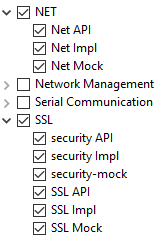Network Core Engine
Principle
The Net module defines a low-level network framework for embedded devices. This module allows you to manage connection (TCP)- or connectionless (UDP)-oriented protocols for client/server networking applications.
Functional Description
The Net library includes two sub-protocols:
UDP: a connectionless-oriented protocol that allows communication with the server or client side in a non-reliable way. No handshake mechanisms, no guarantee on delivery, and no order in packet sending.
TCP: a connection-oriented protocol that allows communication with the server or client side in a reliable way. Handshakes mechanism used, bytes ordered, and error checking performed upon delivery.
Dependencies
LLNET_CHANNEL_impl.h,LLNET_SOCKETCHANNEL_impl.h,LLNET_STREAMSOCKETCHANNEL_impl.h,LLNET_DATAGRAMSOCKETCHANNEL_impl.h,LLNET_DNS_impl.h,LLNET_NETWORKADDRESS_impl.h,LLNET_NETWORKINTERFACE_impl.h(see LLNET: Network).
Installation
NET is an additional module. To enable it, the Net Pack (which bundles several libraries: Net, SSL & Security) must be installed in your VEE Port:
microejPack("com.microej.pack.net:net-pack:11.0.2")
<dependency org="com.microej.pack.net" name="net-pack" rev="11.0.2"/>
Then, using the VEE Port Editor (see Platform Module Configuration), enable the Net library (API, Impl & Mock):

Net Pack Modules
Initialization
When porting the Net library the initialize function shall make sure the underlying network stack is initialized.
The entry point for this initialization is the following native function: LLNET_CHANNEL_impl_initialize:
/**
* @brief Initializes the TCP/IP stack components.
*
* @note Throws NativeIOException on error.
*
* @see LLNET_ERRORS.h header file for error codes.
*/
void LLNET_CHANNEL_IMPL_initialize(void);
It is called during the initialization phase of the Net library so it will run before the application starts.
In most of the VEE Ports a macro llnet_init() is provided to call any specific code required before using the network:
// ...
#include "LLNET_configuration.h" // Macro is defined in this header.
#include "LLNET_CHANNEL_impl.h"
void LLNET_CHANNEL_IMPL_initialize(void) {
llnet_init(); // Custom initialization here.
// ...
}
// ...
An example of how the network is initialized with the same requirements can be found here in the NXP VEE Port for i.MX RT1170 EVK.
Use
The Net API Module must be added to the Application project build file to use the NET library:
implementation("ej.api:net:1.1.4")
<dependency org="ej.api" name="net" rev="1.1.4"/>
This library provides a set of options. Refer to the chapter Standalone Application Options which lists all available options.
